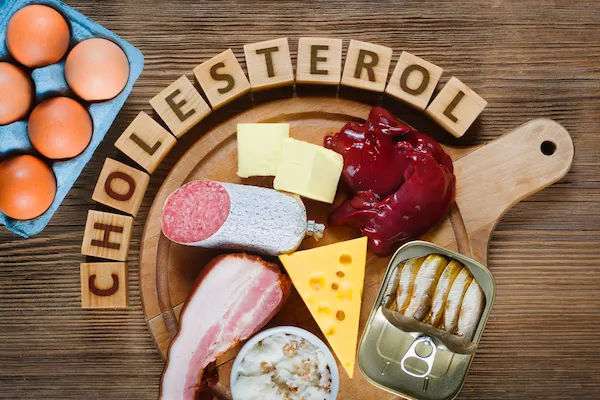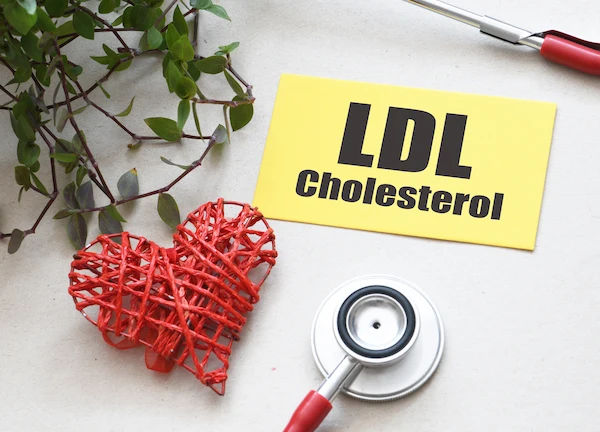Effective Ways to Lower High Cholesterol Naturally
Discover effective natural ways to lower high cholesterol, including diet, lifestyle changes, and home remedies to support heart health.

Written by Dr. Shaik Abdul Kalam
Reviewed by Dr. Mohammed Kamran MBBS, FIDM
Last updated on 13th Jan, 2026

Introduction
High cholesterol is a common health concern affecting millions worldwide, often acting as a silent precursor to more serious cardiovascular issues. But here's the empowering truth: for many, it's a manageable condition. This isn't just about numbers on a lab report; it's about taking proactive steps towards a longer, healthier life. Whether you've recently been diagnosed or are looking to prevent future problems, understanding how to reduce high cholesterol is your first line of defense. This comprehensive guide will walk you through effective, evidence-based strategies, from transformative dietary tweaks and essential lifestyle changes to understanding when it's time to seek medical advice. We'll demystify the science, provide practical tips you can start today, and help you build a sustainable plan for a healthier heart.
Understanding Cholesterol: The Good, The Bad, and The Essential
Before we tackle how to lower it, it's crucial to understand what cholesterol is. Contrary to popular belief, cholesterol isn't inherently evil. It's a waxy, fat-like substance essential for building cells and producing hormones. The problem arises when there's too much of the wrong kind in your bloodstream.
What is LDL (Bad) Cholesterol?
Low-Density Lipoprotein (LDL) is often labeled "bad" cholesterol. It transports cholesterol particles throughout your body. When LDL levels are too high, this cholesterol can slowly build up in the inner walls of your arteries that feed the heart and brain. This buildup forms plaque, a thick, hard deposit that can narrow arteries and make them less flexible, a condition known as atherosclerosis. If a clot forms and blocks a narrowed artery, it can lead to a heart attack or stroke.
What is HDL (Good) Cholesterol?
High-Density Lipoprotein (HDL) is the "good" cholesterol. Think of it as a scavenger, cruising your bloodstream and picking up excess cholesterol, transporting it back to your liver where it's flushed from your body. Higher levels of HDL are associated with a lower risk of heart disease.
Why High Cholesterol is a Silent Threat
The most challenging aspect of high cholesterol is that it has no symptoms. You can feel perfectly healthy while plaque steadily accumulates in your arteries. This is why regular screening is vital. A simple blood test, like the lipid profile offered by Apollo24|7 through convenient home collection services, can provide a clear picture of your levels and your overall heart disease risk.
Health topic carousel:
Lab Test: Lipid Profile Test
Text: Get Your Health Assessed
Dietary Strategies to Combat High Cholesterol
What you eat has a profound impact on your cholesterol levels. Making smart food choices is your most powerful tool.
Embrace Soluble Fibre: Your Digestive System's Broom
Soluble fibre is a superstar for lowering LDL cholesterol. It dissolves in water to form a gel-like material in your gut. This gel binds to cholesterol particles and prevents them from entering your bloodstream, escorting them out of your body instead.
Examples: Oats, barley, Brussels sprouts, legumes (beans, lentils), apples, and citrus fruits.
Goal: Aim for at least 5-10 grams of soluble fibre daily. A bowl of oatmeal for breakfast can provide 3-4 grams.
Choose Heart-Healthy Fats Wisely
Not all fats are created equal. To naturally lower cholesterol, you must swap bad fats for good ones.
Limit Saturated Fats: Found in red meat, full-fat dairy, and butter. These raise your total cholesterol.
Eliminate Trans Fats: Listed as "partially hydrogenated oils" on labels, these are found in margarine, store-bought cookies, and fried foods. They are disastrous for cholesterol levels.
Embrace Unsaturated Fats: These are found in plants and are liquid at room temperature.
Monounsaturated fats: Avocados, olive oil, canola oil, and nuts (almonds, cashews).
Polyunsaturated fats: Walnuts, sunflower seeds, and flaxseeds.
Incorporate Omega-3 Fatty Acids
Omega-3s don't affect LDL cholesterol but have significant heart benefits, including reducing triglycerides and raising HDL slightly. They also help reduce blood pressure and inflammation.
Sources: Fatty fish (salmon, mackerel, herring, sardines) are the best sources. For vegetarians, walnuts, flaxseeds, and chia seeds are excellent options.
The Power of Plant Sterols and Stanols
These are compounds naturally found in plants that have a structure similar to cholesterol. They compete with dietary cholesterol for absorption in the digestive system, effectively blocking it.
Sources: They are found in small amounts in vegetable oils, nuts, grains, and fruits. Many foods, like certain orange juices and yogurts, are also fortified with them.
Health topic carousel:
Doctor's speciality: Nutrition
Text: Consult a Nutritionist for the best advice
Lifestyle Modifications for Sustainable Change
Diet alone isn't enough. A holistic approach is key to long-term success in managing high cholesterol.
Move It: The Role of Regular Exercise
Physical activity is a proven way to raise HDL cholesterol, the good kind. It also helps manage weight and strengthens your heart muscle.
Aim for: At least 150 minutes of moderate-intensity aerobic exercise (brisk walking, swimming, cycling) per week, or 75 minutes of vigorous activity.
Tip: Even short bursts of activity, like taking the stairs or a 10-minute walk after meals, can add up and make a difference.
Achieve and Maintain a Healthy Weight
Carrying excess weight contributes to high cholesterol. Losing even 5-10% of your body weight can dramatically improve your numbers. Weight loss helps lower LDL and triglycerides while boosting HDL. Focus on a sustainable combination of diet and exercise rather than quick fixes.
Kick the Habit: Smoking and Cholesterol
Smoking is a major risk factor for heart disease. It damages blood vessels, making them more prone to accumulating plaque. It also lowers your levels of HDL cholesterol. Quitting smoking can improve your HDL level quickly and significantly, and within a year, your heart disease risk is cut in half.
Limit Alcohol Consumption
While moderate alcohol consumption has been linked with higher HDL levels, the benefits aren't strong enough to recommend it for anyone who doesn't already drink. Excessive drinking leads to weight gain, high blood pressure, and high triglyceride levels, negating any potential benefit.
Beyond Diet and Exercise: Other Crucial Factors
Managing cholesterol involves more than just what you eat or how active you are.
Manage Stress Effectively
Chronic stress can indirectly influence cholesterol levels. Some people cope with stress by overeating fatty foods, becoming sedentary, or smoking. Finding healthy outlets for stress, such as meditation, yoga, deep breathing exercises, or talking to a therapist, can help you maintain a heart-healthy lifestyle.
The Gut-Cholesterol Connection: An Emerging Link
New research suggests the bacteria in your gut (your microbiome) may play a role in how your body processes cholesterol. Certain gut microbes can influence cholesterol levels and how it's metabolized. Supporting a healthy gut with probiotic-rich foods (yogurt, kefir, kimchi) and prebiotic fibre (found in garlic, onions, bananas) may be a valuable, though still emerging, strategy for heart health.
When Lifestyle Isn't Enough: Understanding Medication
For some individuals, especially those with a genetic predisposition (familial hypercholesterolemia), lifestyle changes may not be sufficient to lower cholesterol to a target level. In such cases, medication is a vital tool.
Statins are the most common type, effectively blocking a substance your liver needs to make cholesterol.
Other medications include bile-acid-binding resins, cholesterol absorption inhibitors, and PCSK9 inhibitors.
It's crucial to understand that medication works best in conjunction with a healthy lifestyle, not as a replacement for it. If your cholesterol levels remain high despite diligent lifestyle changes, it is essential to consult a doctor. A healthcare professional on Apollo24|7 can evaluate your personal risk factors and determine if medication is the right choice for you.
Conclusion
Managing high cholesterol is a marathon, not a sprint. It requires commitment to sustainable changes in how you eat, move, and live. By incorporating these strategies, from loading your plate with soluble fibre and healthy fats to committing to regular exercise and stress management, you take control of your heart health. Remember, these changes work synergistically; each positive choice builds upon the last. Start with one or two changes that feel manageable today. Monitor your progress, be patient with yourself, and celebrate your successes. Your heart is the engine of your life, and every healthy choice is an investment in its long-term performance. If you're ever unsure about the best path forward, remember that professional guidance is just a click away.
Frequently Asked Questions (FAQs)
Below are the FAQs:
1. What are the first symptoms of high cholesterol?
A. Typically, there are no symptoms. High cholesterol is a "silent" condition, which is why regular blood tests are crucial for detection before it leads to serious problems like a heart attack or stroke.
2. Can I eat eggs if I have high cholesterol?
A. For most people, moderate egg consumption (up to 7 eggs per week) is considered safe and does not significantly raise blood cholesterol levels. The focus should be more on limiting saturated and trans fats from other sources. However, individuals with diabetes or heart disease should discuss this with their doctor.
3. How quickly can I lower my cholesterol with diet and exercise?
A. You can see improvements in as little as 4-6 weeks with consistent dietary changes and regular exercise. However, significant changes may take 3 to 6 months. Consistency is key.
4. Are there any natural supplements that lower cholesterol?
A. Some supplements like psyllium husk (fibre), plant sterols/stanols, and omega-3 fatty acids (fish oil) can help. However, you should always consult your doctor before starting any supplement, as they can interact with medications.
5. What is a healthy cholesterol level?
A. Aim for total cholesterol: Below 200 mg/dL, LDL ("bad" cholesterol): Below 100 mg/dL (or even lower if you have other risk factors), HDL ("good" cholesterol): 60 mg/dL or higher is considered protective, and Triglycerides: Below 150 mg/dL. Your doctor can help you determine your personal target levels.
Health topic carousel:
Doctor's speciality: Nutrition
Text: Consult a Nutritionist for the best advice



.webp)